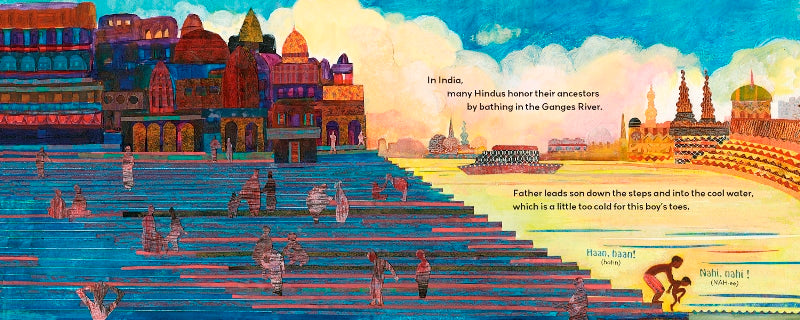Around the World in a Bathtub
Watch this video to follow along with our Activity Guide.

Wade Bradford, author
Wade is a professor of English at Moorpark College and the author of Why Do I Have to Make My Bed? (Tricycle). Wade lives in Santa Clarita, California.
Read more about Wade.
Micha Archer, illustrator
Micha is the author and illustrator of Daniel Finds a Poem (Nancy Paulsen Books), as well as the illustrator of Lola’s Fandango and The Wise Fool (Barefoot Books). Micha lives in western Massachusetts.
Read more about Micha.
- Coming soon!
Booklist
Bradford's picture book makes a splash with its lighthearted, global perspective on the ritual of bathing. "No, no!" squeal the children: "Yes, yes," insist the adults in English, Japanese, Hindi, and a sprinkling of other languages. In some homes, it's not uncommon for nightly ablutions to begin with mama chasing her little one around the house, and end with a happy splash. In some parts of the world, there is a more collective ritual. In Japan, family members bathe in order of age in a large square tub called an oforu. In India, bathing in the Ganges River is an act of honoring ancestors. Turkish baths include scrubbing and mud masks, while in Alaska, a Yup'ik family gathers in a maqii to enjoy (or not) a steam sauna heated by fire and stones. The illustrations are vivid, textured, and energetic, and affectionately reminiscent of Ezra Jack Keats' The Snowy Day (1962). Parents and children will enjoy incorporating the linguistic variations into their own bath-time practices.
Kirkus Reviews
Is it a universal truth that kids don't like baths?
Maybe yes, maybe no. Children's may not like the bathing experience at first, but they often don't want it to end. By home bathtubs, communal baths, lakes, rivers, and even a mud volcano, cajoling adults say, "Yes, yes," while unwilling children shout, "No, no!" These words, in many languages (in English transliteration) and their phonetic pronunciations (n a smaller font), are woven into the illustrations (and so are not always easily read). Exuberant illustrations, emphasizing aqueous blues and greens, are executed in oils with collage elements and finished in Photoshop. The unclothed young children and more modestly covered adults have different skin and hair colors, but the book starts in an unnamed country (the US?) with a loving, brown-skinned mom summoning her reluctant child to an old-fashioned bathtub. The same adorable boy doesn't want to leave the tub at the end and splashes his mom, who then cuddles him reassuringly in a towel. In between these familiar domestic scenes, a Japanese family lines up to use the ofuro, a square wooden tub; Turkish siblings go to the hammann, a beautifully decorated bathhouse; an Indian dad and his little boy go to the Ganges to "honor their ancestors"; and an Alaskan Yup'ik family visits a maquii for a traditional sweat bath. Although there is no map, there are lively explanatory notes.
Instructive on several levels--and good, wet fun!
School Library Journal
While some youngsters take to bath time like fish to water, others struggle with the ritual and need a bit of encouragement and coaxing. This appealing and enlightening nonfiction picture book serves as a resource for universalizing the bath time experience and making connections among different cultures around the world through descriptions of their specific bathing traditions. The work starts with a young boy refusing to get into the tub and proceeds to discuss, through spare, lyrical text, how children from all over the globe sometimes resist bathing. Archer’s bold, bright oil paint and collage art depicts each custom with engaging detail. For each spread, there is also a translation of how to say “no, no” and “yes, yes” in the corresponding language, which will make for a fun, educational read-aloud experience. A list of people who shared their expertise is included in the acknowledgements, which points to careful research, and a “Bathing Around the Globe” section at the end provides a bit more content about each bathing tradition and may spark conversation and inspire readers to seek out more material. VERDICT This geography book with a twist will be useful for read-alouds and for home use.
BookPage
Who’s ready for a bath? After tackling “chores through the ages” in Why Do I Have to Make My Bed?, Wade Bradford takes young readers on a squeaky-clean tour of tubby time in Around the World in a Bathtub. In the opening pages, a young boy runs from his mother at bath time, shouting, “No, no!” as she proclaims, “Yes, yes.” Splashy spats like this one are happening “all over the world,” Bradford explains, “but sometimes in different ways.” For example, in Japan, “family members take turns, from oldest to youngest, relaxing in a square tub called an ofuro.” Bathers in Himalayan valleys enjoy dipping into hot springs, while Columbians might try a mud bath in a small volcano. After touring a bit of the world’s intriguing bathtubs, readers return to the boy and his mother, enjoying part two of their “bath-time battle.” Of course, once kids are in the tub, they don’t want to get out. Micha Archer’s vibrant collages make this book come alive, especially in scenes featuring the bathing boy and his mother. He plays with a beach ball that looks like a globe, quietly reminding readers of the book’s global quest. Meanwhile, there’s plenty of learning to enjoy. With each new country, mothers and kids say, “yes, yes” and “no, no” in their native languages, providing a natural refrain for out-loud readings. Notes at the end of the book add more details about bathing practices in various countries.
Around the World in a Bathtub is a welcome addition to young readers’ nighttime routines.
Hardcover
ISBN: 978-1-58089-544-6
E-book
ISBN: 978-1-60734-947-1 EPUB
ISBN: 978-1-60734-948-8 PDF
Ages: 3-7
Page count: 32
10 x 8
Correlated to Common Core State Standards:
English Language Arts-Literacy. Reading Literature. Grade K. Standards 1, 2, 3, 4, 5, 6, 7, 8, 10
English Language Arts-Literacy. Reading Literature. Grade 1. Standards 1, 2, 3, 4, 5, 6, 7, 8, 10





